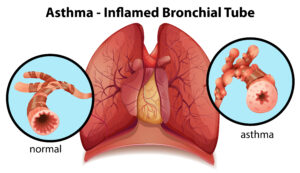Hey Friends:
Asthma is a chronic respiratory condition characterized by inflammation and narrowing of the airways, resulting in symptoms such as wheezing, coughing, chest tightness, and shortness of breath. While asthma itself is a broad term, there are several variants or types of asthma that can occur. Here are some common variants of asthma:
asthmainflamed-bronchial-tube

Allergic Asthma: This type of asthma is triggered by allergens such as pollen, dust mites, pet dander, or certain foods. Exposure to these allergens can cause an immune system response, leading to asthma symptoms.
Non-Allergic Asthma: Unlike allergic asthma, non-allergic asthma is not triggered by allergens. It can be triggered by factors such as cold air, exercise, respiratory infections, irritants (e.g., smoke, strong odors), or emotional stress.
Occupational Asthma: This type of asthma is caused by exposure to certain substances or chemicals in the workplace. It can occur in various occupations, such as farming, manufacturing, hairdressing, or healthcare, where individuals are exposed to specific allergens or irritants.
Exercise-Induced Bronchoconstriction (EIB): Also known as exercise-induced asthma, this variant is triggered by physical activity or exercise. The increased breathing rate during exercise can cause airway narrowing and lead to asthma symptoms.
Cough-Variant Asthma: Instead of the typical symptoms of wheezing and shortness of breath, individuals with cough-variant asthma primarily experience a persistent dry cough as the main symptom. This type of asthma can be challenging to diagnose as it may not present with other typical asthma symptoms.
Occupational-related Asthma: This type of asthma is specifically related to workplace exposures, including both allergic and non-allergic triggers. It can occur in individuals who have pre-existing asthma or develop asthma due to occupational exposures.
It’s important to note that asthma can vary in severity and individuals may experience a combination of different variants. Diagnosis and appropriate management of asthma, including identifying triggers and using appropriate medications, should be done under the guidance of a healthcare professional. Treatment plans are personalized based on individual symptoms, triggers, and overall health.
